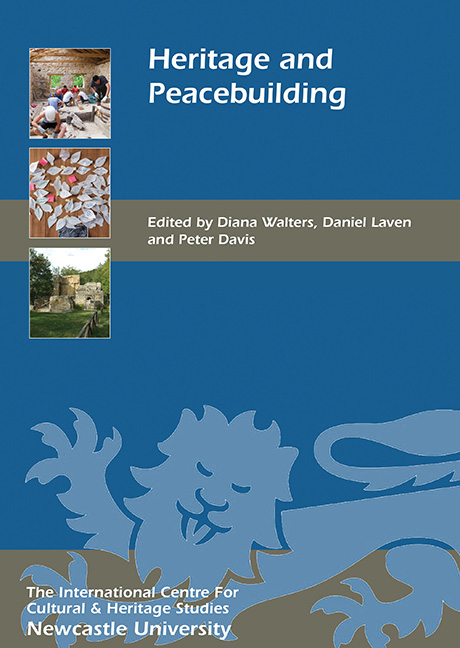Book contents
- Frontmatter
- Contents
- List of illustrations
- Acknowledgements
- List of abbreviations
- Preface
- Introduction
- NEW AND EMERGING IDEAS AROUND HERITAGE AND PEACE
- HERITAGE AND PEACEBUILDING IN PRACTICE
- 7 A Conversation with Sultan Somjee: Conflict and Peacebuilding in Kenya
- 8 Museum, Peace and Reconciliation: the Impact of the Balkan Museum Network
- 9 Diversity, Leadership and Peacebuilding in Museums in the Western Balkans
- 10 Disturbing the Peace: Museums, Democracy and Conflict Avoidance
- 11 Transforming Conflict Through Peace Cultures
- 12 Rethinking Heritage from Peace: Reflections from the Palestinian–Israeli Context
- 13 A Conversation with Will Glendinning: Diversity Challenges in Northern Ireland
- HERITAGE, PEACEBUILDING AND SITES
- List of Contributors
- Index
- Previous Titles
10 - Disturbing the Peace: Museums, Democracy and Conflict Avoidance
from HERITAGE AND PEACEBUILDING IN PRACTICE
Published online by Cambridge University Press: 16 February 2018
- Frontmatter
- Contents
- List of illustrations
- Acknowledgements
- List of abbreviations
- Preface
- Introduction
- NEW AND EMERGING IDEAS AROUND HERITAGE AND PEACE
- HERITAGE AND PEACEBUILDING IN PRACTICE
- 7 A Conversation with Sultan Somjee: Conflict and Peacebuilding in Kenya
- 8 Museum, Peace and Reconciliation: the Impact of the Balkan Museum Network
- 9 Diversity, Leadership and Peacebuilding in Museums in the Western Balkans
- 10 Disturbing the Peace: Museums, Democracy and Conflict Avoidance
- 11 Transforming Conflict Through Peace Cultures
- 12 Rethinking Heritage from Peace: Reflections from the Palestinian–Israeli Context
- 13 A Conversation with Will Glendinning: Diversity Challenges in Northern Ireland
- HERITAGE, PEACEBUILDING AND SITES
- List of Contributors
- Index
- Previous Titles
Summary
A growing number of contemporary museums claim to face the world's troubles head on, embracing universal themes of suffering and injustice with empathy and humanitarianism. These museums use state-of-the-art media and digital technology to profile human conflict in the world within their exhibitions, in vivid colour, from war and human rights abuses to climate change and loss of species, sectarianism, migration, racism and the colonial past.
Some high-profile exhibitions and entire institutions are exploring humanitarian issues of prejudice, colonialism and even genocide – almost to the point of what Didier Fassin calls ‘competitive humanitarianism’ (Fassin 2010). This is generating a growing body of literature on exhibitions tackling difficult subject matter (Bonnell and Simon 2007; Logan and Reeves 2008; Macdonald 2008; Mazda 2004; Sandell 2006; 2011; Teslow 2007; Marstine 2011).
The trouble with this emphasis on humanitarian ‘kindness’ in these museums, promoting as it does peace, happiness and the wellbeing of others in so-called ‘troubled’ parts of the world, is that it actually conceals more than it reveals. In the glossy highlighting of injustices and atrocities, to borrow from Ahmed, ‘it conceals the ongoing realities of discrimination, non-recognition and violence, and requires that we approximate the straight signs of civility’ (Ahmed 2010, 9). Rather than making these injustices more immediate it helps to make them further removed, while at the same time avoiding the realities of injustices closer to home.
Seabrook notes that such evidence of ‘humanitarianism is what the West uniquely practices, bringing its kindness and goodwill to dark places of the world, where savagery and barbarism still rule (or have reappeared) at the heart of “primitive” or regressive cultures’ (Seabrook 2014). This critique of humanitarian ‘giving’ was powerfully echoed in March 2014 by Pheng Cheah (Rhetoric Studies, University of California, Berkeley), in a lecture at London's Birkbeck College tellingly entitled ‘Resisting the Humanitarianization of the World:Towards an Ethics of Giving’. The author also examines how this relates to the nature of museum ‘giving’ and the museum's politics of ‘kindness’ as practised by museums in a paper entitled ‘The Gate in the Wall: beyond happiness-making in museums’ (Lynch 2016).
- Type
- Chapter
- Information
- Heritage and Peacebuilding , pp. 109 - 126Publisher: Boydell & BrewerPrint publication year: 2017



